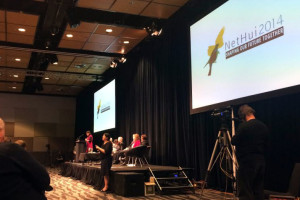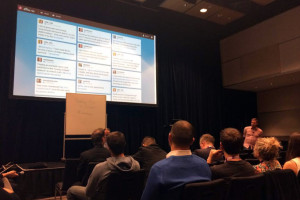Last week I was in Auckland for three days, attending the 2014 NetHui conference (‘hui’ being a Māori word for gathering) which was held at the Skycity Convention Centre. I was thrilled to be given one of the Women Under 25 Fellowship grants provided by Catalyst, and attended a variety of sessions ranging from Rural and Remote Connectivity to Pushing Play on Content.

I spent most of the first day in the Youth Forum, which covered several aspects of the internet’s future - focusing on our vision for the next 25 years. In groups we discussed a range of topics including the roles of parents and teachers in educating children about technology, the possibility of implementing programming into the languages curriculum in schools, and the varying accessibility to different applications and devices for people with visual impairments.
On day two I attended the Youth Wellbeing Online session where, in a very inclusive U-formation, we conversed about youth mental health, cyber-bullying, and suicide prevention. Facilitator Rohan McMahon and Vaughan Davis mentioned a project they are working on to try and identify troubled Facebook users ulitising the social network’s behaviour data to pre-empt self-harm and suicide. Using technology to help young people experiencing these issues is something Social Code is very passionate about as we are currently focusing on developing Code Blue - so it was exciting to hear about other initiatives people are working on.
During (Em)Powering Women Using the Net, attendees were split into four areas of interest. I joined the ‘health’ group, where there was a strong desire for women’s health issues to be discussed online without ‘trolls’, harassment and the fear of consequence in real life relationships. The ‘education and employment’ group discussed ideas on how to encourage more young women into technology roles, an issue I’d recently explored at the NACEW Women in Innovation Summit in Wellington.
In Shared Care Health Records we talked through a discussion paper put together by Office of the Privacy Commissioner senior policy advisor Sebastian Morgan-Lynch, considering the pros and cons for New Zealand implementing an electronic medical record system. The need for patients to be able to partially opt-out of this system was quickly raised, and it was suggested that omitted medical conditions be stored in ‘closed envelopes’ and only available to necessary healthcare professionals in emergency situations.
Thank you to InternetNZ for providing me with a brilliant first NetHui experience, and thank you Catalyst for helping me get there! Check out the NetHui website for further information - maybe we will see you at NetHui 2015!